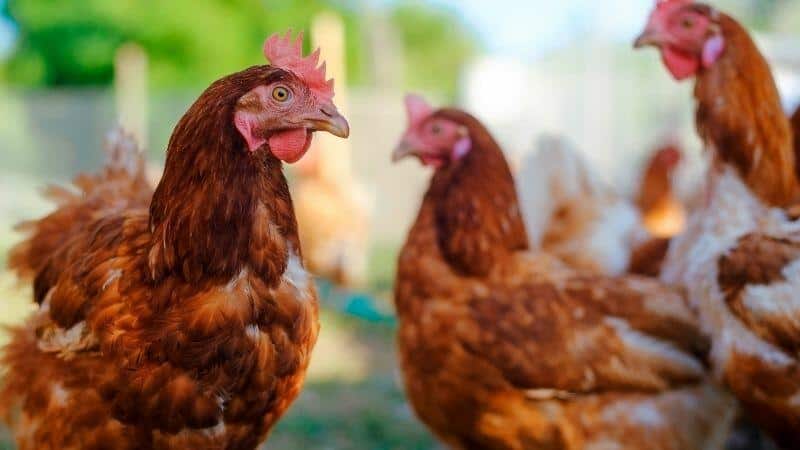You’re sprinkling cayenne on your eggs when your chicken peers through the screen door, eyeing the red powder curiously. Can chickens truly appreciate the zing of spicy flavors? Chickens lack receptors to taste capsaicin heat. So why the interest in fiery foods that provide no flavor payoff?
Without TRPV1 receptors, chickens can’t detect the burn of spices. To them, a jalapeno tastes as bland as a cucumber. With only 24-150 taste buds compared to humans’ 9000, chickens experience little flavor nuance at all.
Still, chickens find spicy foods visually and aromatically enticing. And while they don’t savor the heat, small amounts of peppers and spices offer surprising health benefits for hens. From pest control to egg boosts, zesty seasonings provide advantages despite chickens’
This article explores why chickens peck at peppers with no spicy thrill, how capsaicin-rich foods help hens, feeding tips, and signs of overindulgence. Discover how to safely season your flock’s feed even though chickens will never ask for hot sauce.
Do Chickens Enjoy Spicy Flavors?
While humans bask in the intoxicating burn of our favorite fiery foods, chickens remain unmoved. Here’s why spicy flavors fizzle for fowl:
- No heat receptors – Chickens lack TRPV1 receptors that allow humans to sense capsaicin heat.
- Limited taste buds – With only 24-150 taste buds versus humans’ 9000, chickens have minimal flavor perception.
- Different focus – As omnivores, chickens evolved tasting fat, protein, and carbohydrates over spices.
- Protection instinct – Avoiding bitter unknown foods helps chickens survive. Spicy flavors signal “unsafe” to their senses.
So while chickens don’t register the joy humans get from spicy cuisine, they still find peppers and zesty seasonings attractive. Let’s look at why.
Do Chickens Have a Good Sense of Smell?
While chickens can’t taste spicy excitement, they rely heavily on their sense of smell to assess foods. In fact, smell is more pivotal to a chicken’s experience of flavor than taste.
Chickens have a very strong and complex sense of smell. Their olfactory abilities include:
- Scent receptors in their nostrils as well as the roof of their mouths
- The ability to detect odors at very low concentrations
- Separate receptors for aromatic and irritating odors
- A sensitivity to changes in air pressure that carries scents
- A gland near their nostrils to enhance smelling ability
Their excellent scent detection serves important functions:
- Identifying safe vs. unsafe foods
- Detecting predators or threats
- Bonding with flockmates
- Evaluating potential mates
- Navigating back to the coop
So while chickens may not appreciate spicy aroma nuances like humans, scents still provide their primary impression of food. Strong seasonings entice chickens to sample new flavors. But toxic fumes like smoke trigger their alarm instincts. Their advanced smell abilities remain key to chicken behavior and survival.
Why Chickens Peck at Spicy Foods
Though chickens gain no thrill from spicy excitement, they still show interest in these zingy foods for other reasons:
- Bright colors – Vibrant reds and greens of peppers stand out against typical feed.
- Intriguing scents – Chickens use smell as primary food assessment. Spices smell enticing.
- Textural variety – Crunchy peppers or mushy mashed seasonings contrast standard pellets.
- Mimicking humans – Seeing owners enjoy spicy foods prompts chickens to join in.
- Curiosity – Chickens naturally peck and nibble anything new that catches their attention.
But while chickens find spicy foods attractively novel, how do these seasonings impact chicken health? Let’s explore further.
Benefits of Spicy Foods for Chickens
While the heat and flavor goes unnoticed, turns out zesty spices still provide advantages for chickens:
- Pest control – Capsaicin deters rodents and insects from feed.
- Dewormer – Spicy compounds eliminate intestinal parasites.
- Egg boost – Extra antioxidants from peppers increase egg production.
- Immunity aid – Vitamins and minerals in peppers support health.
- Circulation help – Capsaicin improves blood flow to combat frostbite.
So not only are spicy foods safe for chickens, small amounts provide health perks! Now let’s look at the best sources to reap benefits.
Best Spicy Foods for Chickens
Chickens can enjoy all types of peppers and zesty spices. Each offers its own advantages:
Jalapeños – Improve gut health and worm resistance. Promote egg laying.
Habaneros – Strongest capsaicin levels to eliminate parasites and repel pests.
Cayenne – Boosts circulation and provides warming benefits.
Paprika – Rich in vitamins A and B for eye, skin, and feather health.
Cinnamon – Anti-inflammatory and antimicrobial to support respiratory health.
Turmeric – Soothes join pain and prevents infectious disease.
Garlic – Natural dewormer that also reduces fowl odor!
Ginger – Anti-inflammatory properties plus egg laying enhancement.
When sourcing spicy supplements, always avoid any peppers with green spots, which indicate toxins. Only feed ripe, fully red peppers.
Feeding Chickens Spicy Foods Safely
Chickens will gobble down anything, so follow these tips for safe spicy feeding:
- Start with small amounts to test reactions. Overdoing
spice can cause indigestion. - Mix diced peppers or spices into feed. Feeding as part of balanced meals prevents overindulgence.
- Cut peppers into bite-size pieces. Large chunks pose choking hazards for toss-back eating.
- Remove pepper stems and leaves. These contain toxins that can make chickens ill.
- Introduce new spices slowly. Sudden diet changes cause digestive upset.
- Provide plenty of water. Spicy foods may spark increased thirst.
Follow your chickens’ cues. If they show interest in zesty add-ins, keep feeding. If they avoid or ignore spicy tidbits after a taste, skip the
Dangers of Overfeeding Spicy Foods
While spicy foods benefit chickens in moderation, take care to avoid overfeeding. Too much can cause:
- Digestive issues – Diarrhea, constipation, upset stomach
- Dehydration – Excess thirst and fluid loss
- Nutritional imbalance –
Spice displaces balanced feed - Overstimulation – Chickens may refuse to eat normally
- Choking hazard – Inhaling large chunks
Watch for signs of irritation like decreased appetite, irregular eggs, loose feces, or lethargy after eating spicy foods. Remove zesty add-ins if these symptoms appear.
Conclusion
Chickens cannot truly taste the delicious capsaicin heat sensation enjoyed by





